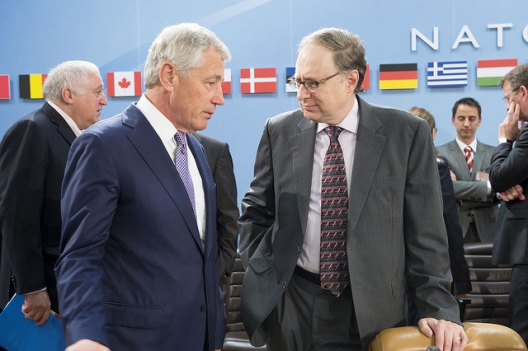 A first, crucial lesson from the recent crisis is that we must maintain a strong defence and deterrence in Europe. If there was ever any doubt, the crisis now makes clear why we must invest sufficiently in defence and security, and why we cannot just keep cutting our defence budgets every year while others around the world continue to boost theirs.
A first, crucial lesson from the recent crisis is that we must maintain a strong defence and deterrence in Europe. If there was ever any doubt, the crisis now makes clear why we must invest sufficiently in defence and security, and why we cannot just keep cutting our defence budgets every year while others around the world continue to boost theirs.
NATO’s greatest responsibility is to protect and defend our territory and our populations. To do that, we must ensure that we have the full range of capabilities to deter and defend against any threat. This means high-end capabilities to deter and defend against large-scale threats to our territory, and expeditionary forces for future crisis management missions. We need to be prepared for all threats. And our people and platforms need to be ready to deploy wherever and whenever required, with the high level of interoperability we have attained through nearly two decades of non-stop operations. This puts a premium on our Smart Defence and Connected Forces Initiatives, including a robust program of training and exercises.
A second key lesson from the recent crisis is that we need not only the right capabilities to project stability, but also the right relationships. And so we must deepen our partnerships with other nations and organisations and explore ways to help others to project stability in their own region. This must include doing what we can to support Ukraine and our other Eastern partners such as Georgia and the Republic of Moldova – in close coordination with the efforts of the European Union and other organizations. And we must keep our door open for new countries to join our Alliance, making clear that no outside power can have a veto.
Finally, the Ukraine crisis has highlighted the importance of the transatlantic bond. In the tough economic climate of the past few years, the temptation to act alone – or in some cases, to opt out – has been strong. But if we want to protect our shared security and our common values, America and Europe must continue to stand together, work together, and act together.
The United States will continue to be involved in Europe’s security, and that involvement is constantly being updated and modernized. We now need European nations to make a greater effort to match the U.S. commitment – both politically and militarily.
Therefore, we need to redouble our efforts to work together to fill key capability gaps, including missile defence, cyber defence, and joint intelligence, surveillance and reconnaissance. We need to more closely combine our efforts to address security challenges on our European doorstep – such as Ukraine. And we need to continue to work together on challenges beyond Europe. The Increased danger in Europe doesn’t mean we can pay any less attention to challenges in the Middle East, Africa or Asia.
We also need to find a better balance of responsibilities between Allies – both between the United States and Europe and between Allies within Europe. Increased multinational cooperation – NATO Smart Defence, EU ‘Pooling and Sharing’ – can make a difference. But ultimately, a better balance can only be achieved by adequate levels of defence spending on the part of all allies, whether measured as a percentage of GDP or in terms of increasing the share of defence budgets devoted to modernization and investment.
Ladies and gentlemen,
The Ukraine crisis has created a new strategic reality in Europe, and NATO must respond. It’s not too late for Russia to turn back from its current path and to seek a peaceful, political solution that respects international law and the rights of sovereign nations. But if Russia chooses confrontation over cooperation, NATO will meet that challenge. We will adhere to our principles, we will engage constructively with partners to support their freedom of choice, and we will continue to protect our Allies.
Excerpt from “A New Strategic Reality in Europe,” speech by NATO Deputy Secretary General Ambassador Alexander Vershbow, April 4, 2014.
Image: Secretary of Defense Chuck Hagel and Deputy Secretary General Alexander Vershbow (photo: NATO)
